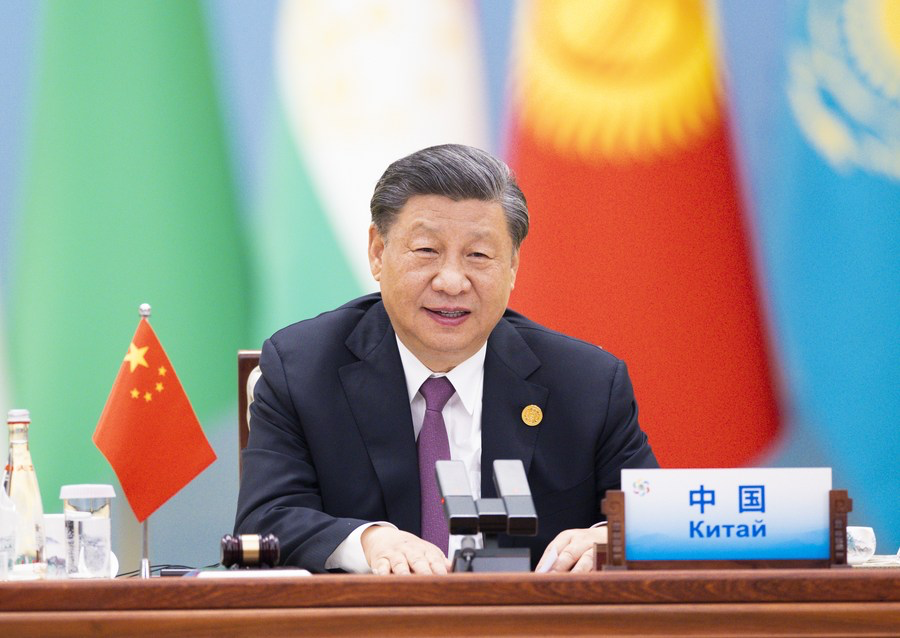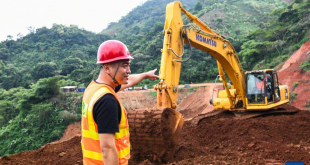Published: May 20,2023

Chinese President Xi Jinping on Friday hailed the new era of China-Central Asia relations and announced a slew of proposals and measures to strengthen their cooperation, as he chaired a high-profile summit in the northwestern city of Xi’an, Shaanxi Province.
China and Central Asian countries have joined hands over the past decade to usher in a new era of their relations, Xi said while delivering a keynote speech at the China-Central Asia Summit, the first in-person summit attended by heads of state of China and the five Central Asian countries, namely Kazakhstan, Kyrgyzstan, Tajikistan, Turkmenistan and Uzbekistan. The relations between China and Central Asian countries have great vigor and vitality in the new era, Xi said. Highlighting the important geographic location of the region, Xi said the world needs a Central Asia that is stable, prosperous, harmonious and well-connected. The sovereignty, security, independence and territorial integrity of Central Asian countries must be safeguarded, the development paths independently chosen by Central Asian people must be respected, and the efforts made by the region to pursue peace, amity and tranquility must be supported, he noted. “No one has the right to sow discord or stoke confrontation in the region, let alone seek selfish political interests,” Xi said, adding that the region has the right foundation, condition and capability to become an important connectivity hub of Eurasia and make unique contribution to the trading of goods, the interplay of civilizations and the development of science and technology in the world. From Wednesday to Thursday, Xi met or held talks with Kazakh President Kassym-Jomart Tokayev, Tajik President Emomali Rahmon, Kyrgyz President Sadyr Japarov, Uzbek President Shavkat Mirziyoyev and Turkmen President SerdarBerdimuhamedov.
Speaking to Xi, the Central Asian leaders expressed their confidence and resolve to strengthen cooperation with China and pursue common development. In Xi’an, the historical starting point of the ancient Silk Road, Xi held a banquet for the leaders Thursday evening in the Tang Paradise, a complex based on the site of the original relic of an imperial garden dating back to the Tang Dynasty (618-907). In 2013, Xi put forward the initiative of jointly building a Silk Road Economic Belt in Kazakhstan, which was met with enthusiastic response and active participation from Central Asian countries. Over the past decade, the joint development of the Belt and Road Initiative between China and Central Asian countries has yielded fruitful results, playing an exemplary role in Eurasia and even in the international community.
CHINA-CENTRAL ASIA COMMUNITY WITH SHARED FUTURE
In his keynote speech at the summit, Xi said that to build a China-Central Asia community with a shared future, efforts should be made to stay committed to the four principles of mutual assistance, common development, universal security, and everlasting friendship. China and Central Asian countries should deepen strategic mutual trust, and always offer clear and strong support to each other on issues of core interests such as those involving sovereignty, independence, national dignity and long-term development, he said. Xi called on the six countries to continue to set the pace for Belt and Road cooperation, to fully unlock the potentials in traditional areas of cooperation such as economy, trade, industrial capacity, energy and transportation, and to forge new drivers of growth in finance, agriculture, poverty reduction, green and low-carbon development, medical service, health, and digital innovation. The six countries should resolutely oppose external interference in the internal affairs of regional countries and attempts to instigate “color revolutions,” and maintain a zero-tolerance stance against the “three forces” of terrorism, separatism and extremism, he said. They should carry forward their traditional friendship, enhance people-to-people exchanges, do more to share their experience in governance, deepen cultural mutual learning, and increase mutual understanding, he added.
CLOSER COOPERATION
The summit has been lauded for creating a new platform and opening up new prospects for China-Central Asia cooperation. In his speech, Xi made an eight-point proposal for strengthening cooperation, ranging from expanding economic ties to promoting cultural exchanges and safeguarding regional peace. China proposes the establishment of meeting and dialogue mechanisms on industry and investment, agriculture, transportation, emergency response, education, and political parties, Xi said. More trade facilitation measures will be rolled out and bilateral investment treaties will be upgraded to push two-way trade to new heights, he said, pledging to support the development of the trans-Caspian international transport corridor and encourage capable enterprises to build overseas warehouses in Central Asian countries.
China will formulate a cooperation program for poverty reduction through science and technology, Xi said. Chinese companies in Central Asian countries will be encouraged to create more local jobs. China will provide Central Asian countries with a total of 26 billion yuan (about 3.7 billion U.S. dollars) in financing support and grants. China is ready to help Central Asian countries strengthen capacity building on law enforcement, security and defense in an effort to safeguard peace in the region, Xi said, adding that efforts should be made to leverage the role of the coordination mechanism among Afghanistan’s neighbors, and jointly promote peace and reconstruction in Afghanistan.
SUMMIT MECHANISM
Speaking at the summit, the Central Asian leaders thanked China for proposing and successfully hosting the first China-Central Asia Summit. China has become a key force in safeguarding global security and stability and promoting sci-tech and economic development, and cooperation with China is indispensable for countries to achieve sustainable development, the leaders said. Lauding the summit for steering China-Central Asia relations into a new era, they vowed to better coordinate the development strategies of their respective countries with the Belt and Road Initiative, and to join hands to cope with challenges and achieve win-win cooperation. Xi and presidents of the five Central Asian countries signed the Xi’an Declaration of the China-Central Asia Summit and adopted a list of summit outcomes. They also announced a decision to officially inaugurate the China-Central Asia Summit Mechanism, with the two sides taking turns to host the biennial summit. The next summit will be held in Kazakhstan in 2025. After the summit, Xi and leaders of the five Central Asian countries met the press. They also planted six pomegranate trees that represent close China-Central Asia solidarity and cooperation. Cai Qi, Wang Yi and Qin Gang attended the events.
Xinhua
 Africa -China Review Africa -China Cooperation and Transformation
Africa -China Review Africa -China Cooperation and Transformation
